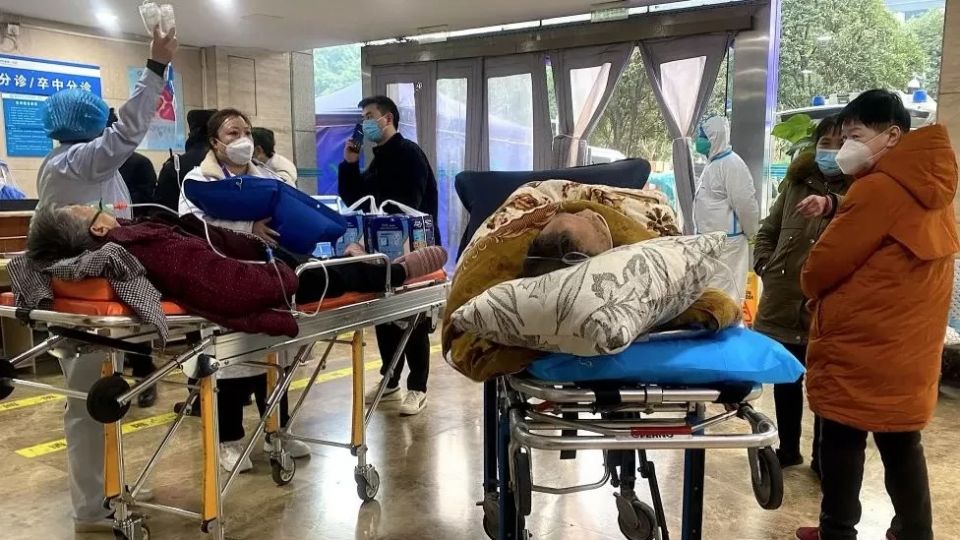
DEC 29: Hospitals across the country appear to be filling up amid a fresh wave of infections, according to the World Health Organization (WHO).
How many Covid cases and deaths are there in China?
Officially, there have only been seven Covid deaths this week (up until 21 December), and none in the previous two weeks.
However, China has limited criteria for confirming Covid-19 deaths, which only includes those who die directly from respiratory illnesses caused by coronavirus, and not deaths caused by its knock-on effects.
The counting method does not correspond with WHO guidance, and results in a figure that is way below the death toll in many other countries.
In the week ending 11 December, official figures showed a fall in the total number of new infections across China after a peak the previous week.
This decline in reported cases may however be explained by significant changes in the way testing for Covid-19 is being carried out.
China has stopped mass testing and is only recording positive cases at hospitals and fever clinics where the patient has Covid symptoms.
Asymptomatic cases and positive results from home-testing kits are not recorded in the data.
How much pressure are China's hospitals under?
Despite the official numbers being low, the WHO has warned the healthcare system in China could be under severe pressure.
Dr Michael Ryan, of the WHO, says: "In China, what's been reported is relatively low numbers of cases in ICUs, but anecdotally ICUs are filling up."
Videos have been emerging on social media appearing to show crowded hospitals.
By cross-referencing with other images posted online, the BBC has been able to verify two videos of overcrowding at a children's hospital in the city of Tianjin in northern China.
However we have not been able to verify many of the other videos which have emerged.
It's difficult to confirm how severe the situation is compared with normal as China strictly controls information coming out of the country.
The BBC's team in Beijing have reported on long queues outside health clinics, and on the high demand for fever remedies at pharmacies.
Temporary health centres are being set up along with intensive care facilities across the country.
National broadcaster CCTV has reported that Beijing's Chaoyang Hospital will boost its capability as the number of incoming patients increased by fourfold.
It's also been reported that in Shanghai an extra 230,000 hospital beds have been made available.
Shanghai-based outlet Kankan News reported the city saw more than twice the amount of emergency calls between 16-20 December compared with same period last year, and a 44% increase in ambulances dispatched.
How has China's Covid policy changed?
There has been a sudden lifting of many of China's Covid restrictions following last month's protests against strict lockdowns across the country.
Before the recent relaxation, China had one of the toughest anti-Covid regimes in the world - known as its zero-Covid policy.
The measures included strict lockdowns even if only a handful of Covid cases had been found, mass testing in places where cases were reported, and people with Covid having to isolate at home or under quarantine at government facilities.
Lockdowns are now targeted to buildings, units or floors rather than to whole neighbourhoods or cities.
Lateral flow tests have replaced PCR tests in most cases, with PCR tests no longer required to enter public transport, restaurants, gyms and other public buildings (with the exception of schools, hospitals and nursing homes).
Amid a severe shortage of rapid test kits, several provinces are implementing a new policy that allows people with mild symptoms or no symptoms to go back to work.
What are China's vaccination rates?
Overall, China says more than 90% of the population has been fully vaccinated.
However, less than half of people aged 80 and over have received three doses of vaccine. The vaccination rate back in April among this age group was much lower - less than 20%.
The authorities now say they require local health services to "strengthen immunization of the whole population, particularly the elderly".
There are doubts over whether the main vaccines used in China - Sinovac and Sinopharm - are effective against Omicron, the most widespread strain.
China has refused to use Western vaccines widely.
The government has given no official explanation. However, national pride may be a factor according to Dr Yu Jie, Senior Research Fellow on China at the international affairs think tank Chatham House:
"I think it's Xi Jinping really thinking of things in terms of economic self-reliance - that need to have China produce and use its own vaccine, rather than import it from somewhere." (with inputs from BBC)












